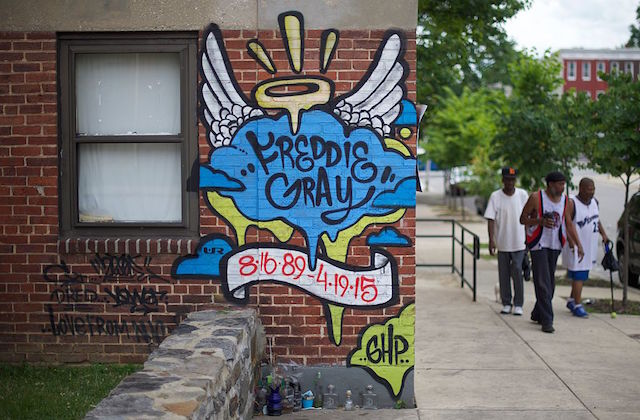Two Baltimore police officers—Caesar Goodson, Jr. and Edward Nero—have been acquitted in the death of Freddie Gray. Now, the four remaining officers who are slated to have their days in court later this year have filed motions that they hope will keep them out of the courtroom entirely.
The Baltimore Sun reports that attorneys for Officer Garrett Miller, Officer William Porter, Lt. Brian Rice and Sgt. Alicia White argued this week that “defects” in the prosecution led to violations of their right to due process and that their cases should be dismissed.
From The Baltimore Sun:
The defects, the officers’ attorneys argued, relate to two recent disclosures—one by a Baltimore sheriff’s major, who said he agreed with prosecutors to sign off on the officers’ charges without personal knowledge of their basis, and another by a police detective, who said prosecutors prompted her to provide misleading testimony to the grand jury that indicted the officers.
The motions were filed on Monday (June 27) and made public the following day. The next trial, for Rice, is set to start on Tuesday. If the charges are upheld, Miller will go to court on July 27, Porter will be retried on September 6 (his first jury was unable to make a decision back in December) and White will report to court on October 13. The officers were all charged for their role in the death of 25-year-old Freddie Gray, who died after suffering a spinal cord injury in police custody. His death sparked an uprising, as Baltimore residents protested state violence.
Baltimore NBC affiliate WBAL reports that a George Washington University law professor who is not affiliated with the case, John F. Banzhaf III, filed a complaint against Baltimore State’s Attorney Marilyn Mosby, the prosecutor who brought the charges against the officers. In the complaint, which was filed with the Maryland’s Attorney Grievance Commission and Office of Bar Counsel yesterday (June 29), alleges that Mosby violated rules of professional conduct:
Complainant respectfully suggests that Respondent appears:
A. to have violated RPC 3.8(a) of the Maryland Lawyer’s Rules of Professional Conduct (RPC) for attorneys which requires that a prosecutor refrain from prosecuting a charge unless it is supported by probable cause, and national standards which establish that a prosecution should proceed only if there is sufficient admissible evidence to support a conviction;
B. to have violated RPC 3.6(b) and RPC 3.8(e) which limit the content of public statements which prosecutors may permissibly make in connection with criminal proceedings;
C. to have violated RPC 3.8(d) by having improperly, illegally, and unconstitutionally withheld and otherwise failed to turn over to defense counsel exculpatory evidence;
D. to, in further violation of RPC 3.8(a), be continuing prosecutions against four of the officers although – especially in the light of detailed findings of fact in two rulings by Judge Barry Williams – there is no longer any basis to reasonably believe that the remaining charges are supported by probable cause, and/or that there is sufficient admissible evidence to support a conviction;
E. to have engaged in conduct which, in its totality, and in light of the above, is inconsistent with the conduct required of attorneys, and especially of public prosecutors, under various ethical standards, including RPC 8.4(c) [“engage in conduct involving dishonesty, fraud, deceit or misrepresentation”] and RPC 8.4(d) [“engage in conduct that is prejudicial to the administration of justice”].
Mosby’s office issued a statement in response to the filing:
Unfortunately, we were only made aware of a recently filed attorney grievance complaint through the media. Because the subject of the grievance relates to pending cases for which a judge has imposed a gag order, we cannot and will not make any comment relating to this matter. The State’s Attorney will continue to respect the judge’s orders as our office has consistently done throughout these trials.
